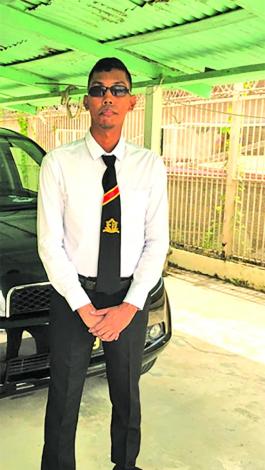Nineteen-year-old Angelica Bassoo and 30-year-old Vishaul Mohabir are on a mission to ensure young people living with disabilities are afforded opportunities to realise their full potential in life.
Bassoo and Mohabir are two of several visually-impaired trainee teachers pursuing an Associate Degree in Disability Studies at the Cyril Potter College of Education (CPCE). They both come from humble beginnings, but have faced similar challenges as a result of their disability.
Bassoo explained that a lot of her challenges in life came from her days as a student, when teachers were not properly equipped to educate students like her.
“Some of them even think we were not capable of being in their class or doing their subjects, because of our disability,” the young woman explained during an interview with Guyana Times. Luckily, Bassoo benefitted from extra classes through the Unit for the Blind.

Bassoo, who also struggled in social settings, explained, “When I was younger, I used to want to take part in everything everyone else was doing; and it used to affect me a great lot, because I always wanted to see what they were doing and why they’re laughing, and these things.
“Cause at that time I never had anyone really to describe what’s going on, because they’re busy watching and laughing and they never had time to explain what was going on in front of (me), it used to hurt a lot; but now I got accustomed to it, and I started learning how to cope with it,” she detailed.
After completing her schooling, Bassoo obtained employment as a mobility training officer at the Guyana Council of Organisations for Persons with Disabilities (GCOPD).
She explained that her goal in life is to help others, and with this in mind, the young woman decided to get trained to become a special needs teacher.
“I want to make a difference, and this is how I can do it: study special education and be able to help students like myself in reaching their highest potential,” she asserted, and added with confidence, “I’ve been blind since birth. I never let that stop me from reaching my goals.”

Vishaul Mohabir says he has faced challenges in life that are similar to what were faced by Angelica Bassoo. He said he never graduated from high school, but after dropping out, later wrote CSEC privately through the Unit for the Blind. Though living with a visual impairment, Mohabir said, he has always had an upbeat attitude about life. He told Guyana Times that navigating life with a disability means getting creative and finding alternative ways of getting things done. “This can mean getting chores done in and around the home, but is also extended to learning institutions, the workplace, and recreational activities.”
Having recognised the complex challenges persons like him face throughout their lives, Mohabir said, he decided to become a teacher in order to inspire others.
“I decided to become a teacher, not just to find the creative ways of delivering the Ministry of Education’s curriculum to children with special education needs and disabilities, but for there to be representation, so children with special education needs and disabilities can know that they too can acquire a secondary education, go onto a tertiary institution in Guyana, and find meaningful employment,” he explained.
Mohabir disclosed that he had worked with various non-governmental organisations prior to beginning his training as a teacher, and
apart from teaching, he sees himself working in the future on projects that would improve the lives of people with disabilities.
Bassoo and Mohabir are both scheduled to graduate in 2026. They hope their stories would inspire other persons living with disabilities to live their lives to the fullest potential.
“Don’t give up! People will have a lot to say, but I will advise you to try to ignore them, especially the negative words and negative actions,” Bassoo has declared.
Mohabir is advising persons living with disabilities to register with the National Commission on Disability and take full advantage of the various opportunities that become available.
Discover more from Guyana Times
Subscribe to get the latest posts sent to your email.














